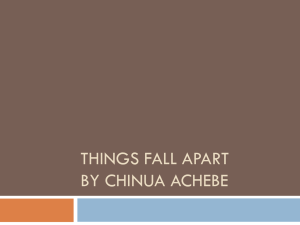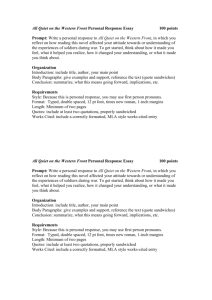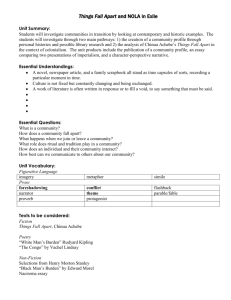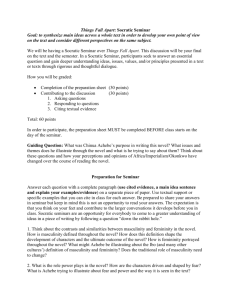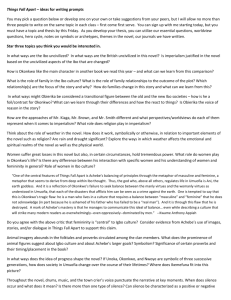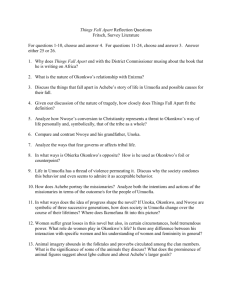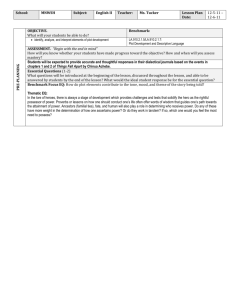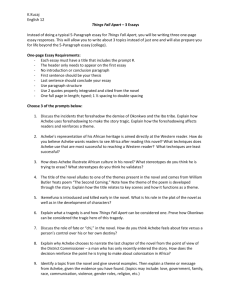Things Fall Apart: Socratic Seminar Questions
advertisement
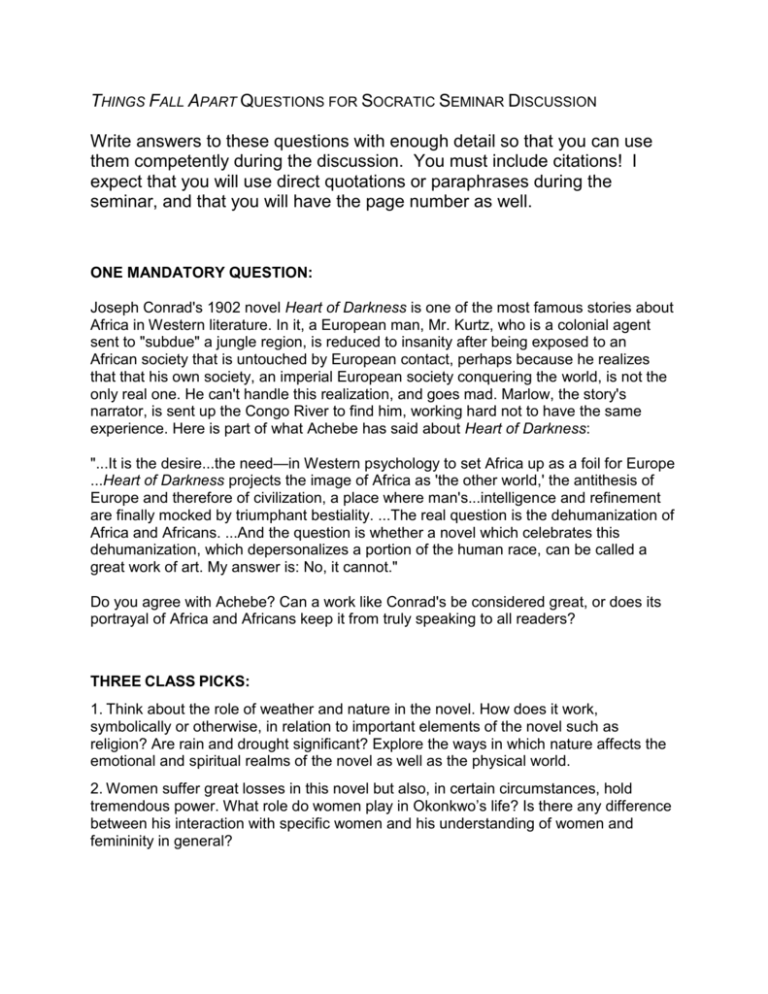
THINGS FALL APART QUESTIONS FOR SOCRATIC SEMINAR DISCUSSION Write answers to these questions with enough detail so that you can use them competently during the discussion. You must include citations! I expect that you will use direct quotations or paraphrases during the seminar, and that you will have the page number as well. ONE MANDATORY QUESTION: Joseph Conrad's 1902 novel Heart of Darkness is one of the most famous stories about Africa in Western literature. In it, a European man, Mr. Kurtz, who is a colonial agent sent to "subdue" a jungle region, is reduced to insanity after being exposed to an African society that is untouched by European contact, perhaps because he realizes that that his own society, an imperial European society conquering the world, is not the only real one. He can't handle this realization, and goes mad. Marlow, the story's narrator, is sent up the Congo River to find him, working hard not to have the same experience. Here is part of what Achebe has said about Heart of Darkness: "...It is the desire...the need—in Western psychology to set Africa up as a foil for Europe ...Heart of Darkness projects the image of Africa as 'the other world,' the antithesis of Europe and therefore of civilization, a place where man's...intelligence and refinement are finally mocked by triumphant bestiality. ...The real question is the dehumanization of Africa and Africans. ...And the question is whether a novel which celebrates this dehumanization, which depersonalizes a portion of the human race, can be called a great work of art. My answer is: No, it cannot." Do you agree with Achebe? Can a work like Conrad's be considered great, or does its portrayal of Africa and Africans keep it from truly speaking to all readers? THREE CLASS PICKS: 1. Think about the role of weather and nature in the novel. How does it work, symbolically or otherwise, in relation to important elements of the novel such as religion? Are rain and drought significant? Explore the ways in which nature affects the emotional and spiritual realms of the novel as well as the physical world. 2. Women suffer great losses in this novel but also, in certain circumstances, hold tremendous power. What role do women play in Okonkwo’s life? Is there any difference between his interaction with specific women and his understanding of women and femininity in general? 3. Animal imagery abounds in the folktales and proverbs circulated among the clan members. What is the significance of some of the animals they discuss? What does the prominence of animal figures suggest about Igbo culture and about Achebe’s larger goals? 4. In what ways does the idea of progress shape the novel? If Unoka, Okonkwo, and Nwoye are symbolic of three successive generations, how does society in Umuofia change over the course of their lifetimes? Where does Ikemefuna fit into this picture? 5. Throughout the novel, drums, music, and the town crier’s voice punctuate the narrative at key moments. When does silence occur and what does it mean? Is there more than one type of silence? Can silence be characterized as a positive or negative occurrence? What are the implications of the fact that Unoka takes his flute with him to the Evil Forest when he dies? 6. Is change destructive? Explore how change reshapes the Ibo culture and community. Is this a good or a bad thing? Why? How does Nwoye figure into the change? How does his character conflict with Okonkwo, and why might Achebe be offering this contrast? Should change come only from within, or is it only possible from an individual or group arriving from the outside? What might Achebe be saying about the colonizing force that arrives in Umuofia? 7. The novel gives many wonderful insights into one of the oldest religions, perhaps the oldest, found in many variations around the world. Scholars call it "animism" because it identifies the world of the spirit (Latin, anima) with the world of nature, identifying the gods in terms of natural forces and phenomena. What examples of animism can you find in the novel? 8. We can say about social organization what we said about religion: The novel gives many wonderful insights into what is probably the oldest approach to social organization found in many variations around the world. Scholars call this a "kinship society." Characteristics of kinship society include the extended family (rather than the individual or the nuclear family) as the meaningful unit of social organization. Moreover, a strongly defined division of labor in terms of sex has been normal in kinship societies. There is also likely to be division in terms of age or other criteria. Can you think of why this might be so under conditions that existed before recent times? Certainly in many kinship societies it is common to speak of male dominance. What evidence of this do you find in the book? Is it the whole story? Does life in the kinship society give the individual more freedom of choice, or less than we are used to? Would the answer be different for Okonkwo? For his son, Nwoye? Okonkwo's wives? For the priestess? 9. Compare the impact of white missionaries on Umofia with that of the political and military officers. How were they different? Which was worse? What do you think Achebe is trying to tell us in the presentation of the two missionaries, Mr. Brown and Mr. Smith?

